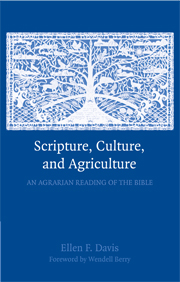Book contents
- Frontmatter
- Contents
- Foreword by Wendell Berry
- Acknowledgments
- Abbreviations
- Introduction
- 1 Rupture and Re-membering
- 2 Reading the Bible Through Agrarian Eyes
- 3 Seeing with God: Israel's Poem of Creation
- 4 Leaving Egypt Behind: Embracing the Wilderness Economy
- 5 A Wholesome Materiality: Reading Leviticus
- 6 Covenantal Economics: The Biblical Case for a Local Economy
- 7 Running on Poetry: The Agrarian Prophets
- 8 Wisdom or Sloth? The Character of Work
- 9 The Faithful City
- Postscript
- Notes
- Scripture Index
- Index
4 - Leaving Egypt Behind: Embracing the Wilderness Economy
Published online by Cambridge University Press: 05 June 2012
- Frontmatter
- Contents
- Foreword by Wendell Berry
- Acknowledgments
- Abbreviations
- Introduction
- 1 Rupture and Re-membering
- 2 Reading the Bible Through Agrarian Eyes
- 3 Seeing with God: Israel's Poem of Creation
- 4 Leaving Egypt Behind: Embracing the Wilderness Economy
- 5 A Wholesome Materiality: Reading Leviticus
- 6 Covenantal Economics: The Biblical Case for a Local Economy
- 7 Running on Poetry: The Agrarian Prophets
- 8 Wisdom or Sloth? The Character of Work
- 9 The Faithful City
- Postscript
- Notes
- Scripture Index
- Index
Summary
The industrial era at climax … has imposed on us all its ideals of ceaseless pandemonium. The industrial economy, by definition, must never rest.… There is no such thing as enough. Our bellies and our wallets must become oceanic, and still they will not be full. Six workdays in a week are not enough. We need a seventh. We need an eighth. … Everybody is weary, and there is no rest. … Or there is none unless we adopt the paradoxical and radical expedient of just stopping.
(Wendell Berry)It is vain for you, early to rise, late to sit down,
eating the bread of the aggrieved.
Yes, he gives to his beloved sleep.
(Ps. 127:2)A MARGINAL CULTURE
Agrarianism is more than a set of farming practices, more than an attitude toward food production and consumption, although both of these are central to it. Agrarianism is nothing less than a comprehensive philosophy and practice – that is, a culture – of preservation. Agrarians are committed to preserving both communities and the material means of life, to cultivating practices that ensure that the essential means of life suffice for all members of the present generation and are not diminished for those who come after. Agrarianism in this sense is, and has nearly always been, a marginal culture, existing at the edge or under the domination of a larger culture whose ideology, social system, and economy are fundamentally different.
- Type
- Chapter
- Information
- Scripture, Culture, and AgricultureAn Agrarian Reading of the Bible, pp. 66 - 79Publisher: Cambridge University PressPrint publication year: 2008
- 1
- Cited by



